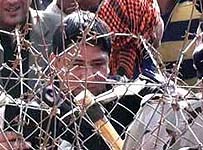A human rights group expressed deep concerns on Sunday about the deteriorating conditions of over 3,000 members of the anti-Iran terrorist Mojahedin-e Khalq Organization who are under torture and harassment by the MKO leaders in Camp Ashraf in Northern Iraq.
According to the Habilian association, a human rights group formed of the family members and  relatives of the Iranian victims of terrorism, only 200 of the nearly 3,500 members of the MKO who are in the group’s main stronghold in Iraq are still loyal to the terrorist group’s leader, Massoud Rajavi, while conditions of the remaining 3300 members who are dissatisfied with their situation and have sought to escape the camp are unknown.
relatives of the Iranian victims of terrorism, only 200 of the nearly 3,500 members of the MKO who are in the group’s main stronghold in Iraq are still loyal to the terrorist group’s leader, Massoud Rajavi, while conditions of the remaining 3300 members who are dissatisfied with their situation and have sought to escape the camp are unknown.
The report also said that the 200 members were those who attacked the Iraqi security forces in the April 8 conflict in the Camp Ashraf, while others refrained from entering the conflict to defend the terrorist haven.
Earlier, a defected member of the MKO had unveiled that the ringleaders of the group are using every means within their reach to control their dissident members, including life threats, to keep members in the group’s main stronghold in Northern Iraq.
"Massoud Rajavi has announced many times that if anybody wants to escape from (the camp) Ashraf (in Iraq), he/she will be killed or executed," Abdollatif Shadvari said.
He reiterated that the ringleaders of the MKO also prevent the members who are residing in Camp Ashraf from taking refuge in other countries, saying, "Ashraf is the only place you have."
Also in March, another defected member of the MKO revealed that the female members of the group have been living under captivity for more than 25 years and are not even allowed to appear in public places alone.
"It can be firmly said that 95% of the women in Ashraf Camp (the terrorist group’s resort in Iraq) have not even been allowed to step in Iraq’s public and recreational places alone all throughout the last 25 years," the defected member said.
The MKO has been in Iraq’s Diyala province since the 1980s. The Baghdad government has assured Iranian officials and people that it is determined to expel the MKO from Iraq by the end of 2011.
Iraqi security forces took control of the training base of the MKO at Camp Ashraf – about 60km (37 miles) north of Baghdad – in 2009 and detained dozens of the members of the terrorist group.
The Iraqi authority also changed the name of the military center from Camp Ashraf to the Camp of New Iraq.
The MKO, whose main stronghold is in Iraq, is blacklisted by much of the international community, including the United States.
Before an overture by the EU, the MKO was on the European Union’s list of terrorist organizations subject to an EU-wide assets freeze. Yet, the MKO puppet leader, Maryam Rajavi, who has residency in France, regularly visited Brussels and despite the ban enjoyed full freedom in Europe.
The MKO is behind a slew of assassinations and bombings inside Iran, a number of EU parliamentarians said in a recent letter in which they slammed a British court decision to remove the MKO from the British terror list. The EU officials also added that the group has no public support within Iran because of their role in helping Saddam Hussein in the Iraqi imposed war on Iran (1980-1988).
Many of the MKO members abandoned the terrorist organization while most of those still remaining in the camp are said to be willing to quit but are under pressure and torture not to do so.
A May 2005 Human Rights Watch report accused the MKO of running prison camps in Iraq and committing human rights violations.
According to the Human Rights Watch report, the outlawed group puts defectors under torture and jail terms.
The group, founded in the 1960s, blended elements of Islamism and Stalinism and participated in the overthrow of the US-backed Shah of Iran in 1979. Ahead of the revolution, the MKO conducted attacks and assassinations against both Iranian and Western targets.
The group started assassination of the citizens and officials after the revolution in a bid to take control of the newly established Islamic Republic. It killed several of Iran’s new leaders in the early years after the revolution, including the then President, Mohammad Ali Rajayee, Prime Minister, Mohammad Javad Bahonar and the Judiciary Chief, Mohammad Hossein Beheshti who were killed in bomb attacks by MKO members in 1981.
The group fled to Iraq in 1986, where it was protected by Saddam Hussein and where it helped the Iraqi dictator suppress Shiite and Kurd uprisings in the country.
The terrorist group joined Saddam’s army during the Iraqi imposed war on Iran (1980-1988) and helped Saddam and killed thousands of Iranian civilians and soldiers during the US-backed Iraqi imposed war on Iran.
Since the 2003 US invasion of Iraq, the group, which now adheres to a pro-free-market philosophy, has been strongly backed by neo-conservatives in the United States, who also argue for the MKO to be taken off the US terror list.

